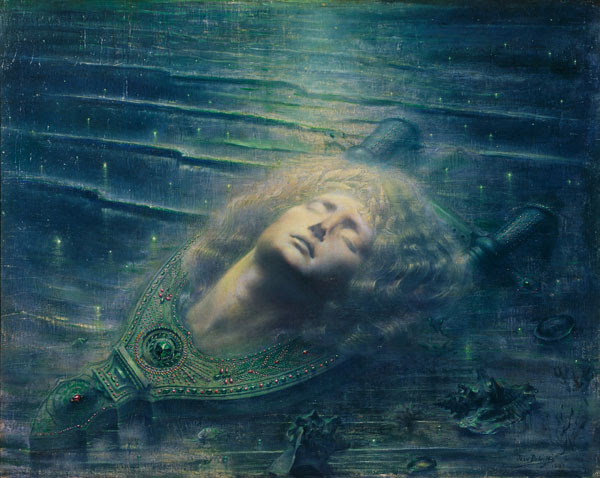구겐하임뮤지엄 특별전 'Mystical Symbolism'
Mystical Symbolism: The Salon de la Rose+Croix in Paris, 1892–1897
Solomon R. Guggenheim Museum, 1071 Fifth Avenue, New York
Dates: June 30–October 4, 2017

(NEW YORK, NY—January 31, 2017)—From June 30 through October 4, 2017, the Solomon R. Guggenheim Museum will present Mystical Symbolism: The Salon de la Rose+Croix in Paris, 1892–1897, the first museum exhibition on this revelatory and significant yet frequently overlooked series of Salons. Mysterious, mythical, and visionary themes, often drawn from literature, prevailed in the art of the six exhibitions, which were held annually in Paris from 1892 to 1897. Images of femmes fragiles and fatales, androgynous creatures, chimeras, and incubi were the norm, as were sinuous lines, attenuated figures, and anti-naturalistic forms. Featuring highlights from the Salons, the Guggenheim exhibition will include approximately forty works by a cross section of artists—some familiar, others less so—and invite a fresh look at and new scholarship on the legacies of late nineteenth-century Symbolist art.
Mystical Symbolism is organized by Vivien Greene, Senior Curator, 19th- and Early 20th-Century Art, with the assistance of Ylinka Barotto, Curatorial Assistant, Solomon R. Guggenheim Museum. Following its New York presentation, the exhibition will travel to the Peggy Guggenheim Collection, Venice, from October 27, 2017–January 7, 2018.
In the spring of 1892 Joséphin Péladan (1859–1918), author, critic, and Rosicrucian, organized the first Salon de la Rose+Croix at the Galerie Durand-Ruel in Paris. Showcasing mystical Symbolist art, particularly a hermetic and spiritually devoted vein favored by the eccentric Péladan, the annual Salons were cosmopolitan in reach and served as a crossroads, gathering the work of artists from Belgium, Finland, France, Italy, the Netherlands, Spain, and Switzerland. Benefiting from extensive research to identify artworks shown in the original exhibitions, Mystical Symbolism will encompass painting, work on paper, and sculpture by artists such as Antoine Bourdelle, Rogelio de Egusquiza, Jean Delville, Charles Filiger, Ferdinand Hodler, Fernand Khnopff, Alphonse Osbert, Armand Point, Georges Rouault, Carlos Schwabe, Alexandre Séon, Jan Toorop, Ville Vallgren, and Félix Vallotton.
Mystical Symbolism provides an opportunity to explore the diverse and sometimes opposing concepts that informed Symbolism in the 1890s. Hinging on central artworks shown at each Salon, the exhibition will tease out seminal tropes, such as the role of Orpheus, adulation of the 15th-century early Renaissance Italian painters known as the Primitives, and the cult of personality that developed around figures including Richard Wagner and Péladan himself. Accompanied by historical documents and set in galleries adorned with lush furnishings, the exhibition conveys the spirit of the Salon experience. A musical component with work by Erik Satie and others underscores the key role occupied by composers for the movement.
Previous exhibitions on the Symbolist movement have focused primarily on a nationality or a broad theme, rather than on a specific event like the cultish Péladan’s Salon de la Rose+Croix. The participants’ diverging ideologies, ranging from politically conservative and Catholic to radically anarchist and anti-clerical, reveal how the varied approaches are dialectically related to the sacred and spiritual philosophies that constituted Symbolist art. By tracing the means through which the Salon proposed these impulses, the Guggenheim exhibition investigates the Symbolist precepts attendant in modernism.
The fully illustrated exhibition catalogue will offer new scholarship on the Salon de la Rose+Croix and Symbolism. It will be comprised of essays on the Salon and its main themes (Vivien Greene, Senior Curator, 19th- and Early 20th-Century Art, Solomon R. Guggenheim Museum, New York), the contemporary reception of the salon (Jean-David Jumeau-Lafond, independent scholar), and the connections between Symbolists tenets and those of early 20th-century avant-garde artists (Kenneth E. Silver, Professor of Art History, New York University). The catalogue will also contain a selected bibliography and artist entries authored by emerging scholars.
Furniture courtesy of Roche Bobois.
ABOUT THE SOLOMON R. GUGGENHEIM FOUNDATION
Founded in 1937, the Solomon R. Guggenheim Foundation is dedicated to promoting the understanding and appreciation of art, primarily of the modern and contemporary periods, through exhibitions, education programs, research initiatives, and publications. The Guggenheim network that began in the 1970s when the Solomon R. Guggenheim Museum, New York, was joined by the Peggy Guggenheim Collection, Venice, has since expanded to include the Guggenheim Museum Bilbao (opened 1997), and the Guggenheim Abu Dhabi (currently in development). The Guggenheim Foundation continues to forge international collaborations that celebrate contemporary art, architecture, and design within and beyond the walls of the museum, including the Guggenheim UBS MAP Global Art Initiative and The Robert H. N. Ho Family Foundation Chinese Art Initiative. More information about the Solomon R. Guggenheim Foundation can be found at guggenheim.org.
VISITOR INFORMATION
Admission: Adults $25, students/seniors (65+) $18, members and children under 12 free. The Guggenheim’s free app, available with admission or by download to personal devices, offers an enhanced visitor experience. The app features content on special exhibitions as well as access to more than 1,600 works in the Guggenheim’s permanent collection. Additionally, information about the museum’s landmark building is available in English, French, German, Italian, and Spanish. Verbal Description guides for select exhibitions are also included for visitors who are blind or have low vision. The Guggenheim app is supported by Bloomberg Philanthropies.
Museum Hours: Sun–Wed, 10 am–5:45 pm; Fri, 10 am–5:45 pm; Sat, 10 am–7:45 pm; closed Thurs. On Saturdays, beginning at 5:45 pm, the museum hosts Pay What You Wish. For general information, call 212 423 3500 or visit the museum online at: guggenheim.org







